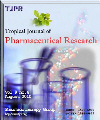
|
Tropical Journal of Pharmaceutical Research
Pharmacotherapy Group, Faculty of Pharmacy, University of Benin, Benin City, Nigeria
ISSN: 1596-5996
EISSN: 1596-5996
Vol. 16, No. 6, 2017, pp. 1349-1355
|
 Bioline Code: pr17172
Bioline Code: pr17172
Full paper language: English
Document type: Research Article
Document available free of charge
|
|
|
Tropical Journal of Pharmaceutical Research, Vol. 16, No. 6, 2017, pp. 1349-1355
| en |
Pharmacodynamic and cytotoxicity effects of Syzygium cordatum  {S Ncik, 48 (UZ)} fruit-pulp extract in gastrointestinal tract infections {S Ncik, 48 (UZ)} fruit-pulp extract in gastrointestinal tract infections
Maliehe, Tsolanku S; Shandu, Jabulane S; Basson, Albertus K; Simelane, Mthokosizi B; Lazarus, G & Singh, M
Abstract
Purpose: To evaluate the pharmacodynamic effect and cytotoxicity of S. cordatum pulp extract in the
treatment of gastrointestinal tract infections.
Methods: The air-dried fruit pulps were ground, extracted with 100 % methanol and screened for
phytochemicals. Serial microdilution method was used to determine the antibacterial activity of the
extract against Bacillus cereus (ATCC 10102), Staphylococcus aureus (ATCC 25925), Enterococcus hirae (ATCC 8043), Escherichia coli (ATCC 25922), Salmonella typhimurium (ATCC 700030), Klebsiella pneumonia (ATCC 4352), Pseudomonas aeruginosa (ATCC 7700), Vibrio fluvialis (AL 019) and Vibrio vulnificus (AL 042). The 3-(4,5-dimethylthiazol-2-yl)-2,5-diphenyl tetrazolium bromide (MTT) assay was
used to assess the cytotoxicity of the extract. Antidiarrheal and antimotility activities were evaluated
using castor oil-induced diarrhoea model in rats.
Results: The extract revealed the presence of alkaloids, cardiac glycosides, flavonoids, saponins and
terpenoids. Total phenolic content was 16.4 ± 1.8 μg/mg. The extract exhibited antibacterial activity with
minimum inhibitory concentration (MIC) of as low as 3.13 mg/ml against B. cereus (ATCC 10102), S.
aureus (ATCC 25925), E. hirae (ATCC 8043), P. aeruginosa (ATCC 7700) and K. pneumonia (ATCC
4352). Median inhibitory concentration (IC50) of 92 μg/ml and therapeutic index of 0.1 - 0.3 were exerted
by the extract. In vivo antidiarrheal activity was 49 % at extract dose of 400 mg/kg, which was much
higher than that of the control (0 %).
Conclusion: The fruit-pulp extract of Syzyhium cordatum has both antibacterial, antimotility and
antidiarrheal activities, and may therefore be clinically safe for use at low concentrations as an
antidiarrheal agent.
Keywords
Syzyhium cordatum; Antibacterial; Antidiarrheal; Antimotility; Cytotoxicity
|
| |
© Copyright 2017 - Pharmacotherapy Group, Faculty of Pharmacy, University of Benin, Benin City, 300001 Nigeria.
Alternative site location: http://www.tjpr.org
|
|
